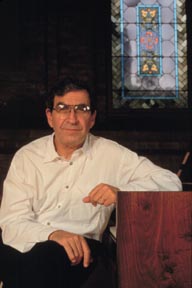Concerts and symposium will honor pianist Malcolm Bilson
By Dan Aloi

Malcolm Bilson often can be seen zipping around Ithaca on his silver motor scooter, on his way to or from the Cornell University campus, off to meet with a graduate student or run errands.
The music professor and internationally famed pianist will keep a busier-than-usual pace as he turns 70 this year and prepares to retire in December. Cornell's Department of Music will celebrate Bilson's life and 37-year career at Cornell in October, with a festival of piano concerts performed on period instruments, a banquet and an international symposium on piano music and piano culture of the 1790s.
"This is beyond just a festival or just about Malcolm's retirement," said Loralyn Light, events manager for the music department. "We're culminating a lifetime of groundbreaking and internationally significant work."
Bilson, the Frederick J. Whiton Professor of Music, joined the Cornell faculty in 1968. After Jan. 1, 2006, he will continue to advise selected graduate students as an emeritus professor. His wife, Elizabeth, recently retired as administrative director of space sciences, a post she held for more than 20 years.
Renowned for his performances of 18th-century piano music on period-appropriate keyboard instruments, Bilson has recorded extensive repertoire by Haydn, Mozart and Beethoven, including a 10-CD box set of Beethoven sonatas he recorded with six of his students. In the 1980s, Deutsche Grammophon released Bilson's landmark recordings with conductor Sir John Eliot Gardiner of the complete Mozart Piano Concertos. A collector's edition of this nine-CD set was issued in 1999.
"Malcolm was not hired here as an early piano music expert; he was hired to play the piano -- which was a Steinway," recalled acting music department chair James Webster. "He turned to the fortepiano only when he saw that such a thing was possible at Cornell."
The week of Bilson's 70th birthday (Oct. 24) will be filled with music to mark the occasion. The Festival of Early Romantic Piano Music will unfold over five evenings in Barnes Hall, on Oct. 20, 21, 22, 25 and 26, with significant but rarely heard works by such composers as Czerny, Clementi, Dussek, Field, Hummel and Weber, among others.
"People are familiar with Beethoven and Schubert from this period," Bilson said. "But this was a period of virtual explosion as pianos began to fill every home, and there is a treasure trove of wonderful music for the instrument that is hardly known."
Bilson will be joined in the free concert series by nine of his current students in the D.M.A. performance practice degree program: Augustus Arnone, Francesca Brittan, Blaise Bryski, Emily Green, Eveliina Kytömäki, Frédéric Lacroix, Shane Levesque, Stefania Neonato and Sezi Seskir. Two of the concerts will be followed by poetry readings, improvisations and musical melodramas -- one program in German and the other in English.
A panel discussion on Bilson's approach to reading music will take place as part of an international musicological symposium Sunday, Oct. 23. Bilson believes that many modern musicians read much of the musical notation of the 18th and 19th centuries incorrectly and that this has had a great impact on performance.
This subject is at the heart of "Knowing the Score," a video project Bilson is currently completing. The DVD, a Cornell production to be released in October, will feature a 90-minute lecture by Bilson, an interview and performances on early pianos of works by Haydn and Schubert, recorded live in Hungary and Vienna.
"There are no conservatories anywhere that have a class in how to read music. You're just supposed to know," Bilson said. "I want to know exactly what Beethoven wrote, and I want to play it the way he's telling me to do it."
Media Contact
Get Cornell news delivered right to your inbox.
Subscribe